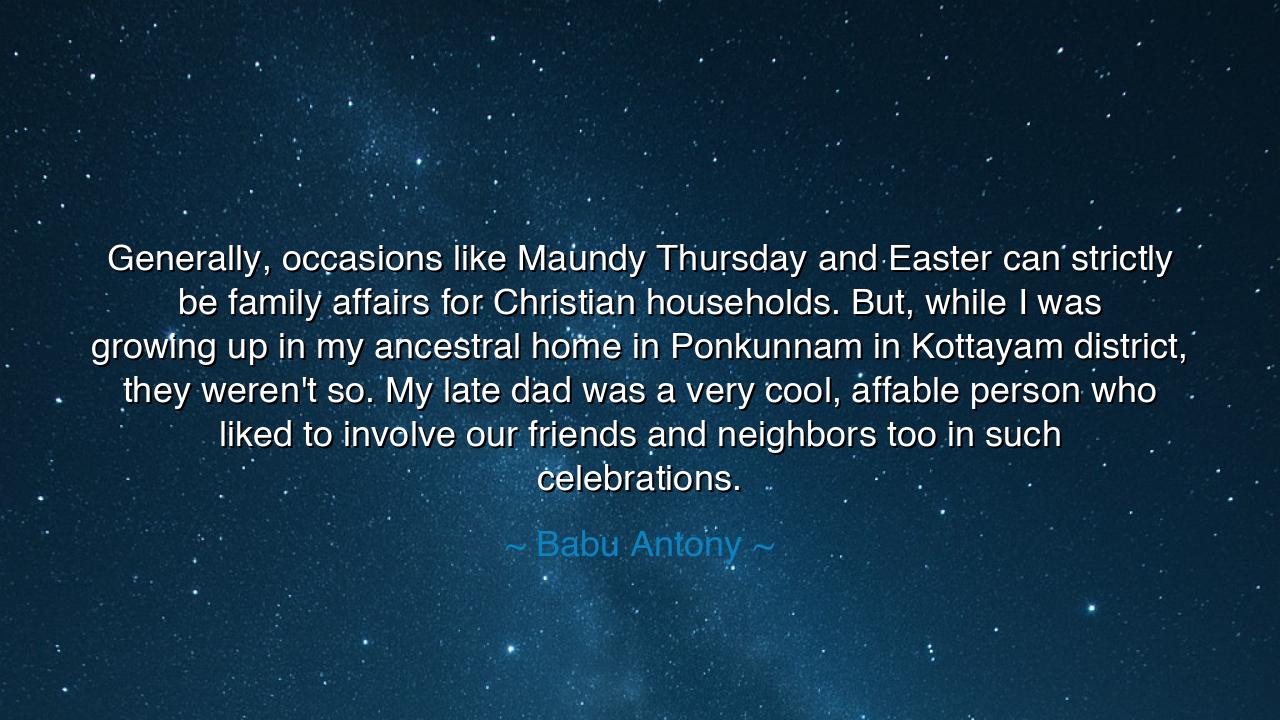
Generally, occasions like Maundy Thursday and Easter can strictly
Generally, occasions like Maundy Thursday and Easter can strictly be family affairs for Christian households. But, while I was growing up in my ancestral home in Ponkunnam in Kottayam district, they weren't so. My late dad was a very cool, affable person who liked to involve our friends and neighbors too in such celebrations.






“Generally, occasions like Maundy Thursday and Easter can strictly be family affairs for Christian households. But, while I was growing up in my ancestral home in Ponkunnam in Kottayam district, they weren't so. My late dad was a very cool, affable person who liked to involve our friends and neighbors too in such celebrations.” Thus spoke Babu Antony, the actor and storyteller, recalling not merely a memory of childhood, but the spirit of community that once animated the sacred days of faith. His words, though simple and filled with affection, carry the fragrance of something ancient — the remembrance of a time when the home was not a fortress of privacy, but a sanctuary of belonging, and when celebration meant not exclusion but embrace.
In these lines, Babu evokes the twin holiness of Maundy Thursday and Easter, days that for Christians mark the greatest mystery of their faith — the sacrifice and the resurrection, sorrow and joy intertwined like the roots of an old tree. For most, such occasions are held within the walls of family, bound by intimacy and reverence. Yet his father, wise in his simplicity, understood that faith deepens when shared. The remembrance of Christ’s love — of bread broken and life renewed — is not a private treasure to be guarded, but a flame meant to illuminate all who draw near. In this spirit, the elder Antony opened his doors, inviting neighbors, friends, and even strangers, not out of duty but from a heart that overflowed with welcome.
This act, seemingly small, carries a profound echo of the teachings that inspired those very days. On Maundy Thursday, Christ Himself broke bread not only with His disciples but with the flawed and the uncertain — with Peter who would deny Him and Judas who would betray Him. In that moment, love conquered all boundaries. By doing likewise, Antony’s father mirrored this divine hospitality. His joy in community was an act of worship, for he saw that to love one’s neighbor is to honor God. The Easter feast, therefore, was not merely a ritual of remembrance; it was a living embodiment of the Gospel — a celebration of unity, forgiveness, and grace.
Consider the parallels in the ancient world, where great houses would open their gates during festivals. In Greece, during the Anthesteria, wine and bread were shared freely among citizens and strangers alike, for the gods, it was said, walked among mortals in disguise. In India’s own traditions, from Onam to Diwali, the home has long been a place of shared light — a reminder that joy multiplies when it is given. So too in Antony’s memory, the ancestral home in Ponkunnam became a place of such divine abundance: laughter mingling with hymns, the scent of spices rising with incense, and the warmth of friendship sanctifying the day more deeply than ritual ever could.
Babu’s reflection is also a lament for what has changed. In modern times, the circle of belonging has narrowed. The home, once open and resonant with shared life, has become private, guarded, and silent. We celebrate behind closed doors, forgetting that the essence of Easter — of any festival, in truth — is rebirth through connection. His father’s example stands as a gentle reminder: that faith, when hoarded, withers; but when given, it blossoms anew in the hearts of others. To invite others into our celebrations is to remind ourselves that love is the one wealth that grows only when shared.
From this memory, a lesson emerges like dawn over the hills of Kerala: hospitality is a sacred duty. To open one’s home is to open one’s heart. To share one’s faith is to share one’s soul. Whether in times of joy or sorrow, when we invite others into our circle, we weave the bonds that hold humanity together. Let every meal be communion, every gathering a resurrection of warmth in a cold and distant age.
Therefore, my listener, learn from the wisdom of that humble home in Ponkunnam. In your own life, resist the isolation that modernity has built around you. When you celebrate, celebrate widely. When you feast, make room at your table for one more. Let your Easter — your moments of joy and renewal — be not a private whisper but a public song. For the truest faith, as Babu Antony’s father knew, is not found in solitude, but in togetherness — where hearts meet, differences dissolve, and the divine finds its dwelling among men.
Thus, from a memory of a father’s kindness arises an eternal truth: that the love we share is the only resurrection that never ends.






AAdministratorAdministrator
Welcome, honored guests. Please leave a comment, we will respond soon